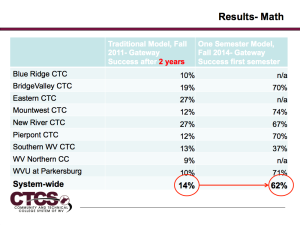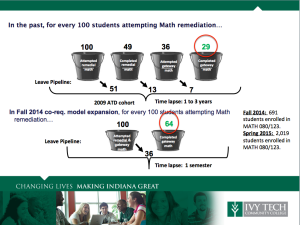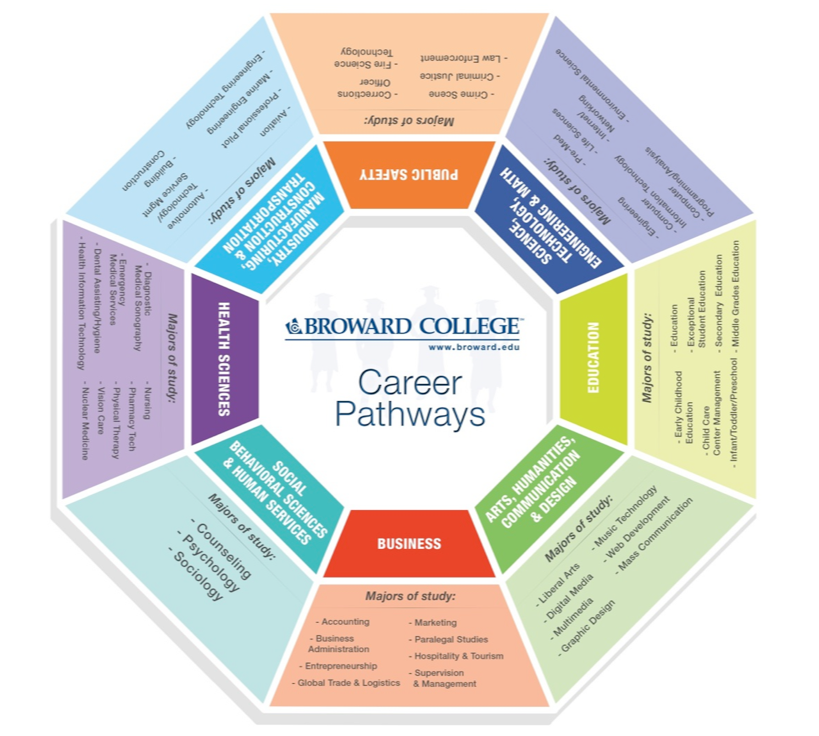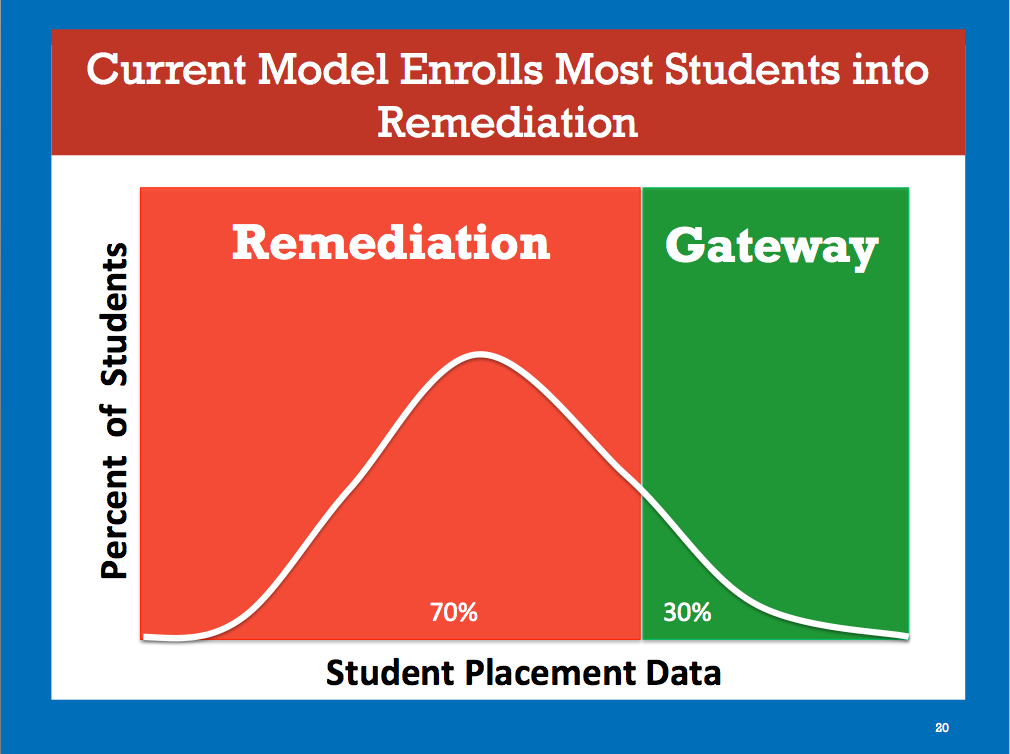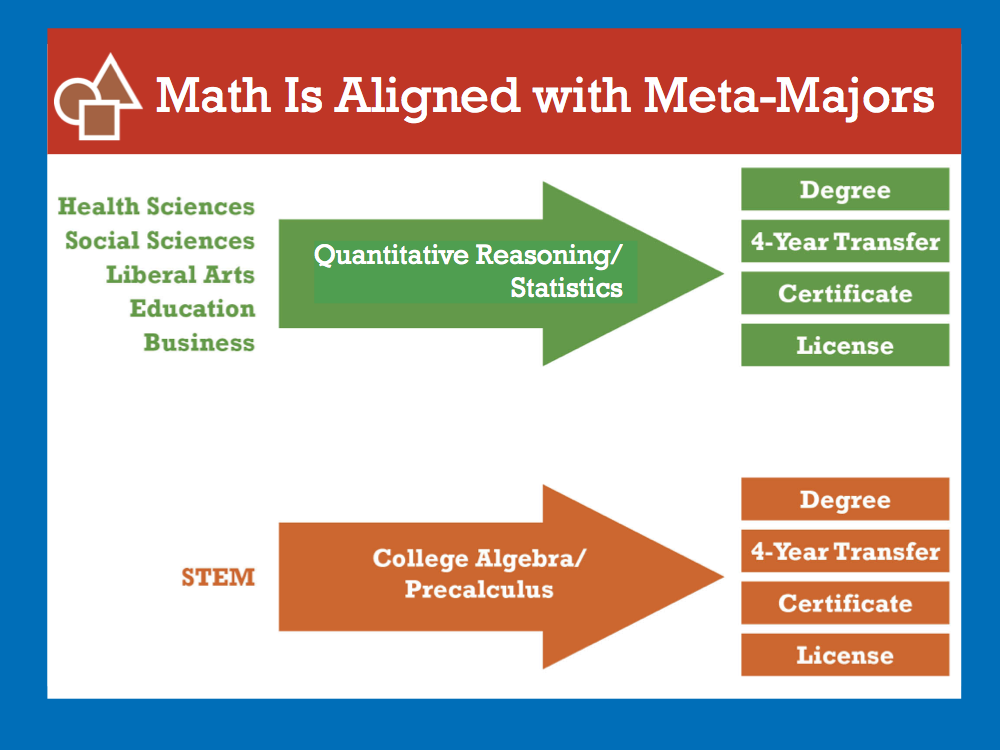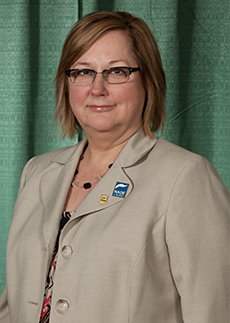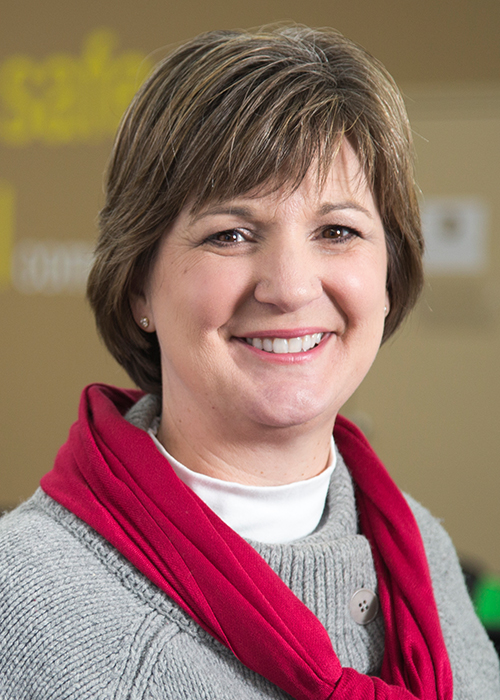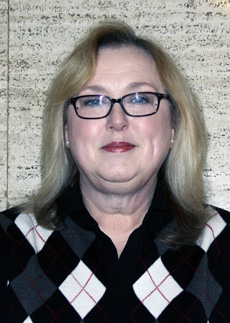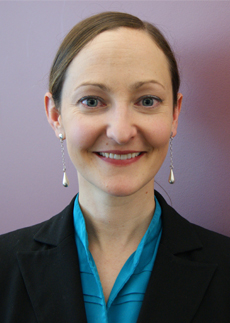
Corequisite Remediation:
Spanning the Completion Divide
Breakthrough Results Fulfilling The Promise
of College Access for Underprepared Students
Far Too Many Students Start In Remediation
Each year, more than a million students begin college in remediation – prerequisite coursework that costs states and students hundreds of millions of dollars but doesn’t count toward a degree. For most of these students, remediation will be their first and last college experience – a reality that is disproportionally true for low-income students and students of color. Even among recent high school graduates – those who should be most prepared for college – 1 in 3 are required, often unnecessarily, to enroll in no-credit, remedial courses.
Traditional Remediation Fails Most Students
Access to remediation is not access to college. Few remedial students ever enroll in, let alone complete, their introductory (gateway) courses in Math and English, and only 17% will graduate.
It comes down to attrition. Most students succeed in their remedial courses but simply fail to enroll in subsequent courses. Off-track and often out of money, more give up than fail. Consequently, many who might have succeeded stop before they ever actually start college-level work.
Percent of students enrolled in remediation who complete the associated introductory (gateway) course
Remediation as a Corequisite – Not a Prerequisite
Corequisite Remediation is doubling and tripling gateway college course success in half the time or better.
Where once there was a bridge to nowhere but college debt, disappointment and drop out, today there is a new, proven bridge to college success – a bridge that is spanning the divide between hope and attainment. We call it Corequisite Remediation.
Read MoreIn Corequisite Remediation, students enroll directly into college-level courses and receive academic support alongside their regular classes. Rather than facing a long sequence of prerequisite, non-credit courses, students get up to speed while working toward their degree. Additional, mandatory class periods or customized support in a lab provide academic support “just in time” within a college-level course.
Percent of students enrolled in remediation who complete the associated introductory (gateway) course
The Bridge Builders
States are stepping up and acting boldly to transform developmental education in this country. Corequisite Remediation works, and these states are proving it.
What Does Remediation Look Like in Your State?
1. Review current stats
2. Use the sliders to apply Corequisite Remediation
Blueprint
Build Your Own Corequisite Remediation Program on a Solid Foundation Using These 6 Pillars
Colleges must end the practice of using placement exams to sort students into multiple levels of remedial education. Instead, colleges should deploy a comprehensive intake process to discern students’ academic goals, career goals and overall college readiness, including both academic and non-cognitive measures. The process should result in students choosing a broad area of study or meta-major and enrolling in appropriate gateway courses, particularly in math, that will enable them to enter a program of study in their first academic year.
—
Corequisite Remediation is a critical component of a comprehensive student success strategy for those traditionally deemed unprepared. National college completion leaders and state higher education leaders recently converged around a new document entitled Core Principles for Transforming Remedial Education Within a Comprehensive Student Success Strategy. The core principles outline how colleges can fundamentally redesign the way students in need of additional academic support are served. With the principles in mind, CCA offers these pillars for to spur greater success for those who have traditionally been placed into remedial education.
All students should to be treated as college students on day one, rather than as remedial students who must demonstrate their readiness for college before entering a program. As a result, the default placement for the vast majority of students who may not be optimally prepared for college-level courses should be college-level courses with built-in or concurrent support in the form of Corequisite Remediation.
Current placement practices often result in students who could be placed into college work being required to enroll in remedial courses that ultimately delay and undermine their ability to earn a credential. Instead, advisors and students should jointly decide the most appropriate level of support students require to pass college-level courses and enter a program of study within their first year. Students who are enrolled in college-level courses and receive appropriate support are far more likely to commit themselves to student success.
—
Corequisite Remediation is a critical component of a comprehensive student success strategy for those traditionally deemed unprepared. National college completion leaders and state higher education leaders recently converged around a new document entitled Core Principles for Transforming Remedial Education Within a Comprehensive Student Success Strategy. The core principles outline how colleges can fundamentally redesign the way students in need of additional academic support are served. With the principles in mind, CCA offers these pillars for to spur greater success for those who have traditionally been placed into remedial education.
The vast majority of students who require additional academic support in college-level courses should receive it as a corequisite while enrolled in a college-level course. There are many different approaches to corequisite support that have proven to dramatically increase success rates in college-level courses. While there are differences in approach, all are designed to provide students more time on task on the content and skills that are essential for success in the college-level course. The most successful models enroll students in college-level courses and provide support within one semester. Approaches include:
- Additional class periods before or after the college-level course that review material in the college-level course and provide instruction in basic skills.
- Required lab or tutoring sessions that enable more customized support for students on the relevant course material.
- Accelerated content in the basic skills required in the college-level course for the first few weeks of the semester, followed by the college-level course within the first semester.
Two semester models that provide college-level instruction and academic support over the course of an academic year are also successful but don’t have the results of single semester models. In addition to providing academic support, these courses may include support in other college success skills, like study habits, time management and other organizational skills.
—
Corequisite Remediation is a critical component of a comprehensive student success strategy for those traditionally deemed unprepared. National college completion leaders and state higher education leaders recently converged around a new document entitled Core Principles for Transforming Remedial Education Within a Comprehensive Student Success Strategy. The core principles outline how colleges can fundamentally redesign the way students in need of additional academic support are served. With the principles in mind, CCA offers these pillars for to spur greater success for those who have traditionally been placed into remedial education.
Colleges must abandon the use of long remedial education sequences that would prevent students from completing college-level courses in one academic year. In addition, colleges should require all students to enroll in college-level courses and receive the support they need within the first academic year. Students who do not complete gateway courses and enter a program of study are far less likely to complete a postsecondary credential.
If there are students who might not be ideally suited for corequisite support in either a single semester or two semester model, then every effort should be made to ensure students have the opportunity to complete college-level courses and enter a program of study in their first academic year. Additional strategies that would complement corequisite models would be abbreviated bridge courses of one or two weeks that fully prepare students for enrollment in corequisite courses.
Technology-based or other intensive practices can be deployed to enable students to both assess their readiness and receive support in the essential skills needed to get them ready for college-level courses. Every effort should be made to ensure all students enter college-level courses in their first academic year.
—
Corequisite Remediation is a critical component of a comprehensive student success strategy for those traditionally deemed unprepared. National college completion leaders and state higher education leaders recently converged around a new document entitled Core Principles for Transforming Remedial Education Within a Comprehensive Student Success Strategy. The core principles outline how colleges can fundamentally redesign the way students in need of additional academic support are served. With the principles in mind, CCA offers these pillars for to spur greater success for those who have traditionally been placed into remedial education.
College algebra should no longer be viewed as the default gateway math course. Instead, college algebra should be viewed narrowly as a preparatory course for programs that require precalculus or calculus.
Colleges should develop alternative gateway math courses for programs of study that do not require calculus. For many programs, a rigorous course in quantitative reasoning or statistics would be more appropriate.
Efforts should be made at the state level to ensure that all math pathways and their associated gateway courses are applicable to program of study requirements and are fully transferable across institutions. In addition, colleges should abandon the long algebra-based remedial sequences for non-calculus based pathways and replace them with academic support that is aligned to success in quantitative reasoning, statistics or other college-level courses.
Colleges that have created alternative math pathways and provided academic support in gateway courses as a corequisite have seen dramatic improvements in student success.
—
Corequisite Remediation is a critical component of a comprehensive student success strategy for those traditionally deemed unprepared. National college completion leaders and state higher education leaders recently converged around a new document entitled Core Principles for Transforming Remedial Education Within a Comprehensive Student Success Strategy. The core principles outline how colleges can fundamentally redesign the way students in need of additional academic support are served. With the principles in mind, CCA offers these pillars for to spur greater success for those who have traditionally been placed into remedial education.
Corequisite support will dramatically increase the number of students who pass a college-level gateway course and enter a program of study within one year. Once that occurs it is incumbent on colleges to maintain additional supports for these students through the implementation of other Game Changer strategies like GPS Direct, 15 to Finish and Structured Schedules. Building a system of corequisite support for all students who require additional academic support will result in dramatic improvements in college completion when combined with all of Complete College America’s Game Changers.
—
Corequisite Remediation is a critical component of a comprehensive student success strategy for those traditionally deemed unprepared. National college completion leaders and state higher education leaders recently converged around a new document entitled Core Principles for Transforming Remedial Education Within a Comprehensive Student Success Strategy. The core principles outline how colleges can fundamentally redesign the way students in need of additional academic support are served. With the principles in mind, CCA offers these pillars for to spur greater success for those who have traditionally been placed into remedial education.
Download your own customized pathway to Implement Corequsite Remediation

Myra Snell
Math Lead, California Acceleration Project; Math Faculty, Los Medanos College
Myra Snell is the Math Lead for the California Acceleration Project, coaching and creating curricular materials to support faculty teaching pre-Statistics courses. She is a Professor of Mathematics at Los Medanos College, where she has been teaching courses from arithmetic to calculus and statistics for the last 20 years. Snell createdPath2Stats, the first pre-Statistics course in the country to provide a one-semester alternative to the traditional multi-level developmental algebra sequence. Snell’s past roles at Los Medanos include working with faculty across campus to assess outcomes and use the results to improve learning experiences for students. She was a coach for the Faculty Inquiry Network, worked with Carnegie-Mellon’s Open Learning Initiative in Statistics, and served as a consultant to the Carnegie Foundation’s Statway project.










